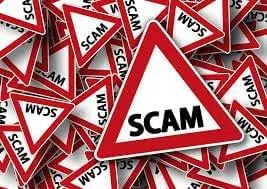August 12, 2020 – The Better Business Bureau is warning of more diverse and sophisticated scams operating amid the pandemic.
A new report released by the organization finds many scammers have taken advantage of COVID-19 by posing as officials from the Center for Disease Control and Prevention or the Internal Revenue Service.
“In my 32-year career at the Better Business Bureau, I have never seen the scams increasing so much,” said Steve Bernas, president and CEO of the BBB Illinois. “Consumers are home on their PCs more. They’re not going out as much and they’re doing all their shopping, it seems, online now.”
Bernas says current circumstances are making it easier to separate you from your money. One scam features a scammer pretending to be from the IRS and offering to expedite payment from the government. Another has the scammer posing as a contact tracer and asking for personal information.
“It seems to be increasing in Illinois” Bernas said. “There’s only one way to put scams out of business and that’s not to give them your business. Consumers need to remember that because nobody can help you get the money back afterward.”
Officials warn that those government imposters scams are becoming more prevalent in recent months. Bernas says Social Security scams have been especially effective.
“The reason [they] are so successful is because they basically call you on the phone and the caller ID says ‘Social Security Administration.’ I think consumers and businesses believe that the caller ID is 100% accurate,” Bernas said. “That is not the case.”
Bernas says consumers should be on high alert, as scammers use enhanced fear and intimidation tactics in the midst of the pandemic.
“The Better Business Bureau suggests you do not answer your phone if you do not recognize the number,” Bernas said. “Let it go to voicemail, let them leave a phone number or message and then you can do the research on that phone number or call the organization that they’re saying they’re from and make sure it’s legitimate.”
The report from the BBB featured some warning signs that you might be dealing with a scammer. Among them were requests for “unusual” payment methods, such as wiring funds or sending gift cards, along with demands for immediate action.
“If they want you to act in 30 minutes or less and want information quickly, that is a scam,” Bernas said. “No government agency is going to call you demanding information, demanding payment. No government agency operates like that.
A recent survey found that 44 percent of Americans have been contacted by one of these impersonators, leading to $450 million in losses since 2015.
“My biggest frustration in my 32-year career has been from consumers who freely give up their information or money,” Bernas said. “They lose their life savings when they could have made a quick call to the BBB and been told that’s a scam in a matter of minutes.”
For information or to report a scam, visit bbb.org.

